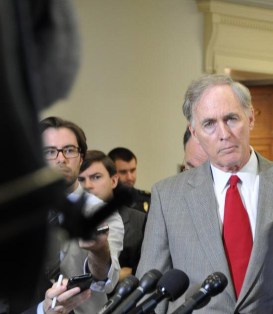
Cliff Stearns in the seamy spotlight.
Rep. Cliff Stearns (R-Fla.) was a moderate back when GOP moderates were allowed in the House of Representatives. Those days are past, however, and Stearns has had to scramble to adapt to the new atmosphere of Tea Party fruitcakery. He was trounced in the race for chair of the House Energy and Commerce Committee in 2010, largely because his colleagues viewed him as a squish. Earlier this month, he announced he’s leaving his district to escape a Tea Party primary challenge, jumping to a newly drawn district nearby. Now he’s desperately trying to bank enough money and credibility with conservatives to survive beyond 2012.
The process has not been kind to his dignity or his integrity. Instead, Stearns has wormed his way into one of the seamier niches in the Republican ecosystem: circus ringmaster for show-trial investigations designed to create headlines, the niche Darrell Issa (R-Calif.) had hoped to dominate. The investigation into Planned Parenthood and the investigation into Solyndra are both Stearns’ babies; both have dragged on forever and both have uncovered zero wrongdoing. That hasn’t stopped Stearns from playing partisan warrior with a crude zeal that frequently crosses the line into cringe-worthy absurdity (like when he said Energy Secretary Steven Chu should be fired over Solyndra).
Stearns is not a smooth talker like Paul Ryan (R-Wis.); he tends toward Kinsley gaffes, when politicians accidentally reveal what they really believe. Recall, for instance, in November, when he said, “when somebody is successful, then you give them the subsidies and the tax credit.” Last week, he said something similar when pressed about why he won’t launch an investigation into the $8.3 billion loan guarantee to Southern Company for the Vogtle nuclear reactors: “The loan you are talking about … is for a proven industry that has been successful and has established a record.”
First of all … really? The federal government’s role is to subsidize companies and industries that are already successful?
Second of all … really? The nuclear industry has an established record of success? Not one that inspires confidence. Here’s what Rep. Ed Markey (D-Mass.) said in his letter to Chu [PDF] on the Vogtle loan:
The proposed nuclear loan guarantee to the Southern Company is $8.3 billion, far larger than any previous loan guarantee under the DOE program and more than 15 times larger than the loan guarantee granted to Solyndra. Credit rating agencies have spoken loudly and clearly about the financial risk associated with this project. Over the last 18 months, the Southern Company has had its credit rating downgraded by both Moody’s and Morningstar as a direct result of its pursuit of this nuclear project. Private financial markets have shown no interest in financing new nuclear projects because the technology’s long track record of delays, cost overruns, and project defaults. On top of that, wind, solar, and natural gas have recently become much cheaper, further eroding the competitiveness of nuclear power. Just last week, the president of the Nuclear Energy Institute, Marv Fertel, suggested that low natural gas prices would push back construction of nearly all planned nuclear projects by a decade or more.
This is from the Southern Alliance for Clean Energy:
Original plans for Plant Vogtle in the 1980s included four reactors at an estimated cost of $660 million. Only two reactors were built, at a cost of more than $8 billion. This inflated final price tag led to the largest rate hike Georgia customers had ever experienced. The estimated cost of the two new Vogtle reactors is more than $14 billion, but as ratepayers in Georgia are aware, the final price tag could be much higher. Southern Company’s projection is that Unit 3 will become operational in 2016, and Unit 4 in 2017. Georgia Power customers are already paying, on average, a monthly surcharge of $3.73 to finance the Vogtle project, and that figure will likely increase if Southern Company is not stopped.
Meanwhile, a 2011 report from the Congressional Budget Office found that the federal government is substantially undercharging for nuclear loan guarantees and indeed that it may be impossible to charge fees high enough to cover risks, since doing so would scare off all potential borrowers.
With an established record of success like that, what could go wrong?
But never mind all that. Let’s take Stearns at his word: He thinks Southern Company has a strong record.
The day after defending the idea of government loans to successful companies, he had this exchange with Greta Van Susteren on Fox, regarding the DOE’s $1.4 billion loan to a company called Prologis to undertake the largest rooftop solar installation in U.S. history:
Van Susteren: Why were we giving federal stimulus money in a loan to Prologis? I went on the internet, and this is a company that has $43.3 billion in assets. They say they’re the leading owner, operator, and developer of industrial real estate in the Americas, Europe, and Asia, and they operate, apparently, 600 million square feet. Why do they need our money?
Stearns: They don’t. And that’s — that’s really what is the basis of, I think, the investigation of the [Oversight and Investigations Subcommittee] that I chair, is we see favoritism, Greta, throughout the stimulus package.
Hm, $43.3 billion in assets. A world leader in industrial real estate. Sounds like a company “that has been successful and has established a record”! When that happens, “you give them the subsidies and the tax credit,” right?
Unless they want to buy solar panels! Then it’s “favoritism.”
What Stearns is failing to properly obfuscate is that the GOP has no principled aversion to government assistance to industry. What they have is an allegiance to the energy status quo — fossil fuels and nuclear power — and a determination to fend off possible challengers. Fealty to the wealthy and politically entrenched is the motive force behind Stearns’ investigation, and indeed the entire House GOP agenda.



